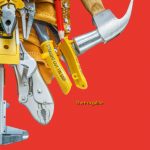(Psst: The FTC wants me to remind you that this website contains affiliate links. That means if you make a purchase from a link you click on, I might receive a small commission. This does not increase the price you’ll pay for that item nor does it decrease the awesomeness of the item. ~ Daisy)
By the author of What School Should Have Taught You: 75 Skills You’ll Actually Use in Life
I’m looking around at the state of the economy at the moment, and I really don’t think that there’s any way that one can say that what’s happening in Washington DC isn’t impacting them.
We just witnessed the collapse of a very large bank out in California, a subsequent bailout, another kajillion dollar aid package to Ukraine, and have recently been told that taxes here are going to be raised.
When you combine all this with the very rapid inflation that we’re seeing, the conclusion that I come to is that it would be very prudent for people to pay off their debt as rapidly as possible. I’ve touched on this issue before, but I really think that it’s worth the time and energy to encourage people in this regard once more.
Here’s why debt repayment is important now.
If I’m a small-time bank that’s facing immediate insolvency and have zero chance of being bailed out like the big guys, I’m going to do what I can to survive. Sure, I may have 800 mortgages, 1000 cars, and 500 small-time loans that I’ve financed, and they’re gradually resulting in income for me, but I have millions of dollars that I have to pay out within a month, or I’m going to be out of a job (along with all of the employees who depend upon me for a paycheck).
So what do I do?
I call in the loans.
Those people now have 30 days (or whatever the legal timeframe is) to pay off the rest of their loans or I get to take their collateral. This could be their homes, vehicles, tools, whatever. As the banker, I need money to pay off my debts as quickly as possible, I need that money now (*opera* “Call JG WENTWORTH. 877 Cash nowwwww!”), and inflation is only making it so that I’m getting more and more screwed with the loans that I’ve already put out there. If I can call in my loans, I can then take those homes and vehicles and (hopefully) quickly turn them around for sale so that I can pay off the debt that I have.
There’s a lot of incentive from the small-time banker’s viewpoint for going this route, and I can’t help but think that this is going to be a very common recourse at some point down the road.
You probably need your car to make it to work. You probably enjoy not living in your parent’s basement. But if those loans get called in and you’re not able to make several thousand-dollar payments all of a sudden, are you going to have a recourse?
This is one of the reasons that I think it’s very important that people really try to pare down their debt as much as possible. If you can pick up extra shifts, cut out unnecessary expenses, or sell some things to help you to have less debt, you’re going to be much safer in the long run. Getting out of debt protects you from your debtors. You can better handle sky-high taxes, the curve balls of life, and avoid having your stuff taken away from you as a result.
I think this is really an inflation-fighting measure as well.
If you regularly have to shell out $3000/month for expenses and $1500 of that money goes directly to loans, you’re really just living off of $1500/month.
Back in 2019, you were able to go to the grocery store with a hundred-dollar bill and walk away with a full cart. Walk into your local Piggly Wiggly today with ol’ Ben Franklin, and you’ll leave with a dozen eggs. Perhaps your loans have remained exactly the same throughout the course of the past five years, but now your purchasing power is much less than what it once was. You technically have the same number of dollars to spend, they just don’t buy as much as they used to.
But if you can whittle down your debt to where you’re now only having to put out $1000 a month to loans, you now have an extra $500 a month that you can use as something of an “inflation hedge.” You’ll still be able to put gas in your tank without feeling like you’re going to have to eat ramen for the next week.
Here are some resources for paying off debts.
So, you’re deep in debt. What do you do now?
Here are a few resources that may help.
- How to Use the Snowball Method to Get Out of Debt FAST
- How to SLASH Your Fixed Expenses
- What to Do When You Have Sudden Money Problems
- Debt Free Degree
- The Total Money Makeover
What do you think?
I’m no financial expert, and none of this is financial advice, but I do encourage you to ponder over this. Living debt-free is wise.
Are you living with excessive amounts of debt at the moment? If so, what can you do to whittle as much of it away as fast as possible? Do you think these bank runs and bank collapses are going to impact the average American, even if he doesn’t have an account at them? What advice would you give to others who are trying to pay off debt?
Tell us what you’re thinking in the comment section.
About Aden
Aden Tate is a regular contributor to TheOrganicPrepper.com and TheFrugalite.com. Aden runs a micro-farm where he raises dairy goats, a pig, honeybees, meat chickens, laying chickens, tomatoes, mushrooms, and greens. Aden has four published books, What School Should Have Taught You, The Faithful Prepper, An Arm and a Leg, The Prepper’s Guide to Post-Disaster Communications, and Zombie Choices. You can find his podcast The Last American on Preppers’ Broadcasting Network.












11 thoughts on “Why You Need to Focus on Paying Off Debt NOW”
Last fall I paid cash to buy out my leased car for a fraction of what I could resell it for now. Last week I paid off 1/2 of my mortgage and plan on paying off the rest within the next 12 months. I could finish paying off the mortgage right now, but I want a cushion just in case of a major repair/etc. I do not trust govt and I think what you wrote is truth regarding banks.
What I have done is work a full time and part time job, scaled down my expenses as much as possible and saved, saved , saved! I am looking at retirement at the end of 2024 and I have worked hard for when I am at that point to have no major expenses.
For others wanting to pay off debt……1st lower your standard of living. You don’t need to eat out all the time. You don’t need to keep up with the Jones’s. You can work two jobs. I’m 66 yrs old and I have held down a full time and part time job for a long time. Grow a garden. Find salvage stores for food/etc. Cook from scratch. Hit up the Goodwill or Volunteer stores for clothes. There are so many ways to help pay off debt.
As someone once said, Don’t try to keep up with the Jones, BE the Jones.
Let people see how well you can live on a tight budget. You may well be able to convert someone to frugal living for whom the concept seems foreign,
I think you’l be much better advised to devote some of that extra cash and earnings to finding ways to earn more money in which you have more control over raising the prices of your services, for example. Employees generally don’t have that freedom — the employer sets the employees’compensation … regardless of however much theft of purchasing power the employees suffer from central banking counterfeiting the money supply in order to benefit endlessly greedy governments and uber-wealthy “friends” of the central bank.
You won’t find any provisions in mortgage contracts for either commercial or residental customer that give the lender a free pass to foreclose just because the inflation rate is jacked up to seriously jeopardize the purchasing power of the incoming payment stream of any lender.
I have seen commercial lenders that were leaned on by federal banking regulators to do “whatever is necessary” to beef up their balance sheets by whatever is legally possible. The unfortunate result has been that some such banks would file fraudulent foreclosure lawsuits against their borrowers even if those borrowers have a long running perfect record of making their payments on time. I had personal experience with one such commercial property developer after the 2008 financial collapse who had to spend $100,000 to successfully defend against four fraudulent foreclosure lawsuits by the same lender. After winning in court he sought replacement lender money outside of the federally regulated banking system so he would never again suffer that kind of war.
Even though there is probably no residential mortgage that has a provision allowing the lender to foreclose at will even while the borrower is making perfectly reliable and on-time payments, such lenders could easily have the motivation to do so because of the same damage inflation does to the purchasing power value of their incoming payment streams.
The point is that you the borrower benefit the lender’s purchasing power by paying off any loan ahead of the contractual schedule — but you instead benefit by stretching those payments out as long as is contractually legal and possible — while doing everything possible to increase your earning and investing skills and your ability to set and raise the prices of whatever services or business values you can offer in the market place instead.
In cases of hyperinflation where the value of money is simply trashed because of unlimited and unaccountable government spending/counterfeiting (that was once a death penalty offense before governments got into that racket), there has been a history of some people resorting to barter and precious metals to make survival possible. There are even such overseas-based gold bullion deposits in Swiss vaults for which you can purchase whatever amounts you want and have the ability to buy. Access to such wealth is via a Mastercard for whatever amount you need to pay. Glintpay.com (a UK-based business) opened the use of their charge cards to the USA about four years ago. That beats carrying around a chunk of gold which is not conveniently divisible like charge card transactions.
Speeding up your payments as much as possible is exactly backwards and does much unnecessary damage to your purchasing power in the face of any inflation/counterfeiting war against you and the general population.
–Lewis
I agree with you that carrying a significant amount of debt is never a good idea, but I don’t think the economy is terrible enough to justify your somewhat breathless approach. For example, the rate of inflation has been dropping for several months now, not increasing as you suggest.
I agree with you – there is smart debt (a reasonable mortgage and perhaps a reasonable vehicle loan). $100 will get you more than a dozen eggs at the store. Well unless you are shopping in Germany right before Hitler took over.
Inflation is dropping and interest rates are probably a bit higher than they should have been YEARS AGO. Cheap money hence “hey, I can afford that speed boat”. The interest rate on my only credit card was 12% – shopped around years ago and went with a good one. Most are 20 – 20.25% these days. Not that I’ve carried a balance in 40+ years and even before, the balance was a few hundred till got past the initial outlay of moving out.
People who depend on the government’s published inflation rate are going to be badly deceived. It has long been a way to lie to the public and suppress such government obligations like Social Security which are indexed to the official inflation falsehood.
Just in the last few years the Federal Reserve has counterfeited more US dollars than were ever previously created in the last nearly 250 years. That enormous increase in the money supply takes some time to ripple through the economy as early receivers (close friends of the Fed) of such money get first crack at valuable deals before that ripple effect makes life miserable for the rest of us as prices skyrocket.
I did omit one critical issue in my earlier post. That was about adjustable rate mortgages. Anyone who was suckered into accepting such is positioned to get clobbered when lenders choose to defend the purchasing power of their incoming payment streams by jacking up the payment amount due each month. If you are one of those unfortunate souls paying on such a mortgage … you can investigate how much better off you would be by refinancing (ie., replacing) into a fixed rate mortgage before the real inflation rate has rippled through the economy and pushed your payments above what you can afford.
Call such strategy “breathless” if you want … but realize the criminally irresponsible money printing/counterfeiting is a monstrous war to steal the purchasing power of the US dollars you either earned or inherited.
–Lewis
I watch prices in my area – they are GOING DOWN. I know, shocker to the sky is falling folks (regardless of who is in the WH and majority house/senate party). You live at the end of the supply chain, you’ll pay more, pure and simple. You live in a dying rural town in a state pining for the 1950s, you’ll pay more.
And where are my Biden bucks? You were so *sure* and 2022 has come and gone.
I like a lot of what you say here, Lewis, as well as the original article, but did want to make a point about following portion of what you were saying.
“The point is that you the borrower benefit the lender’s purchasing power by paying off any loan ahead of the contractual schedule — but you instead benefit by stretching those payments out as long as is contractually legal and possible — while doing everything possible to increase your earning and investing skills and your ability to set and raise the prices of whatever services or business values you can offer in the market place instead.”
That really depends on the type of loan. Paying off the debt early does benefit the borrower quite a bit, because a person saves a ton of money in interest charges. Stretching the loan out for as long as possible may be good to do, depending on the situation, but it also causes the lender to ultimately spend a lot more in interest than they otherwise would have. So the decision of what to do can vary a lot.
In response to the original article, in a situation like this I personally would choose to pay off any secured debt first, but take my time depending on my own financial situation and my personal needs. For example if I had a car and a credit card I would probably make minimum payments on the card and aggressively pay off the car, then work on the card after that. If there were a major collapse the credit card company might not even be there after a while!
Exactly re: paying off secured debt first. You are better off paying for college via credit card than HELCO/second mortgage/student loans (subsidized or private). TTFN to the credit card debt if you file bankruptcy. Don’t use your house as a bank (think 2008 collapse). Reliable transportation (public transit doesn’t exist in rural ‘merica) means you can be employed.
*HELOC
Oh my – just when I was seeing the light at the end of the tunnel, my car breaks down. I still don’t know what is wrong nor how much it will cost. If it is an engine needing replacement, my Efund cannot handle that AND not sure it would be worth the cost to do so on a 17 year old car with 250K miles. Either way, fix it or replace the vehicle, my budget and paying off what I have remaining right now is daunting.